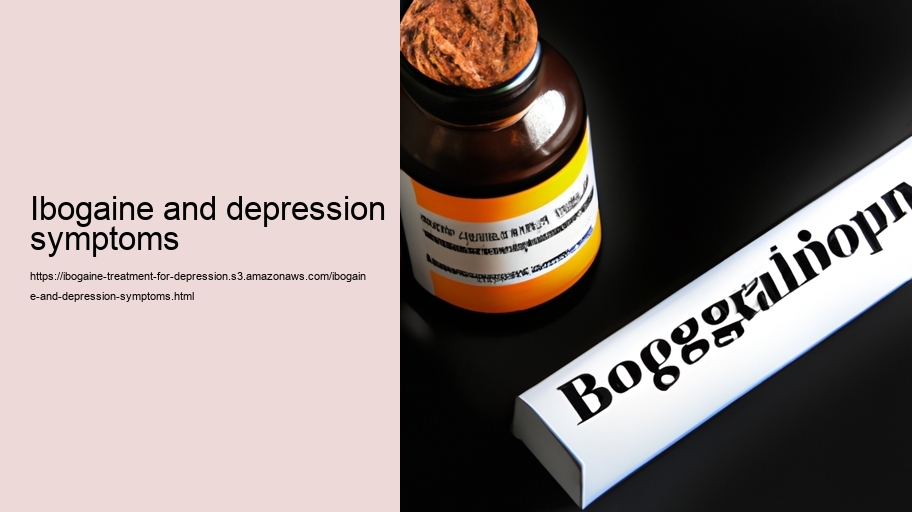Title: Ibogaine and the Potential Alleviation of Depression Symptoms: Hope on the Horizon
Abstract:
In recent years, a renewed interest in alternative therapies for mental health conditions has led to explorations beyond conventional pharmaceuticals. Ibogaine, a naturally occurring psychoactive substance derived from the African iboga shrub, has emerged as a potential candidate for treating various psychiatric disorders, including depression. This essay delves into the research surrounding ibogaine's effects on depression symptoms, discussing its pharmacological properties, anecdotal evidence, and the challenges it faces within the realms of medical acceptance and legality.
Introduction:
Depression is a pervasive mental health disorder that affects millions worldwide. Characterized by persistent feelings of sadness, loss of interest in activities, and an array of physical and emotional problems, it can severely impact one's quality of life. While traditional antidepressants have been effective for many patients, some continue to struggle with treatment-resistant depression (TRD). This has prompted scientists and clinicians to investigate alternative treatments like ibogaine that could offer hope to those who have not found relief through standard medical approaches.
The Substance: Ibogaine Explained
Ibogaine is an indole alkaloid found primarily in Tabernanthe iboga—a plant native to West Africa—used for centuries by indigenous peoples in spiritual ceremonies. In western societies, it gained attention during the 1960s as a potent psychedelic with unique properties that differentiated it from other hallucinogens such as LSD or psilocybin. Its ability to interrupt substance addiction patterns made it especially intriguing for researchers interested in psychopharmacology.
The Connection Between Ibogaine and Depression Symptoms
Several mechanisms may underlie ibogaine's potential efficacy against depression symptoms:
1. Neuroplasticity: Research suggests that ibogaine may promote neurogenesis and synaptic plasticity—the brain's ability to form new neural connections—which are often impaired in individuals suffering from depression.
2. Glutamate Modulation: By regulating glutamate levels—an important neurotransmitter involved in mood regulation—ibogaine could help rebalance brain chemistry associated with depressive states.
3. Opioid System Interaction: Although not an opioid itself, ibogain interacts with opioid receptors known to play a role in mood regulation.
Anecdotal Evidence and Preliminary Studies
Many personal accounts highlight profound experiences during which individuals report significant improvements in their mood following treatment with ibogain. Small-scale studies have also noted reductions in depressive symptoms post-treatment; however, these findings are preliminary due to limited sample sizes and lack of control groups.
Challenges Faced by Ibogaine as a Treatment Option
Despite its potential benefits for TRD patients:
- Legality Issues: Iboga-derived substances are classified as Schedule I drugs under international law because of their psychoactive properties.
- Safety Concerns: Without proper medical supervision or standardized dosing guidelines—and given its association with cardiovascular risks—Iboganine poses significant safety concerns.
- Insufficient Clinical Trials: There is currently a lack of rigorous clinical trials needed to establish therapeutic protocols or confirm efficacy definitively.
Conclusion:
While there is growing interest in using iboga-derived substances such as iboganine for treating depression symptoms—particularly TRD—the current state of knowledge remains nascent at best. The promising results seen thus far warrant further investigation through well-designed clinical trials that can provide more conclusive evidence about its effectiveness while establishing safer treatment practices.
Reflection:
The quest for novel interventions reflects humanity’s inherent desire for healing and wellbeing; however caution must be exercised when considering unconventional treatments such as iboganine given their complex legal status combined with potentially serious health implications without appropriate oversight or understanding yet fully achieved within scientific communities across globe today.
This reflective piece serves not only underscore critical need comprehensive study but also reminds us remain open possibilities where conventional medicine might fall short offering solace those grappling shadows cast by relentless grip depression holds over countless lives around our planet seeking light hope where sometimes seems none existent before them just out reach perhaps until now?
